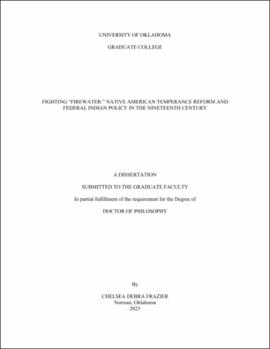| dc.contributor.advisor | Metcalf, Warren | |
| dc.contributor.author | Frazier, Chelsea | |
| dc.date.accessioned | 2023-12-08T14:54:21Z | |
| dc.date.available | 2023-12-08T14:54:21Z | |
| dc.date.issued | 2023-12-15 | |
| dc.identifier.uri | https://hdl.handle.net/11244/340022 | |
| dc.description.abstract | In 1802, Little Turtle, Chief of the Miami, wrote to President Thomas Jefferson explaining the increased presence of alcohol in Indian Country. This sparked a century of Indigenous peoples fighting to control alcohol and assert their sovereignty in the face of growing encroachment from the United States. Natives saw the detrimental impact alcohol had on not only their tribal sovereignty but also on how non-Natives viewed their communities. Restricting the whiskey trade and reforming alcohol policy helped the tribes' ability to resist the non-Native groups that used alcohol for coercion and to perpetuate the “drunken Indian” myth. Throughout the nineteenth and twentieth centuries, American Indian nations and the United States federal government contested the boundaries of sovereignty. Individuals often apply American Indian sovereignty, or the belief in tribal power and authority, to a tribe’s ability to assert influence over their political and legal system. Rather, this dissertation argues that sovereignty during the nineteenth century took on many forms, and the fight for temperance is illustrative of how tribes asserted their sovereignty through cultural and societal processes. By focusing on temperance, this work offers a fresh approach to sovereignty by demonstrating how tribes used their agency to assert cultural sovereignty and self-determination through reforming their society in the face of an expanding United States. This is not a study in Native alcoholism; rather it argues that Indigenous peoples used temperance as a way to assert their sovereignty and strengthen their sense of nationalism and self-determination. The relationship between sovereignty and temperance intersects with other reform movements and shifting Indian policy during the nineteenth century. Indigenous Nations did not rely on the U.S. federal government to regulate the trade of alcohol within Indian Country. They instead took it upon themselves and used their tribal sovereignty to regulate the whiskey trade within their territory. | en_US |
| dc.language | en_US | en_US |
| dc.subject | History, United States. | en_US |
| dc.subject | History, Native American | en_US |
| dc.subject | Sovereignty, Native American | en_US |
| dc.subject | Temperance, United States | en_US |
| dc.title | Fighting “Firewater:” Native American Temperance Reform and Federal Indian Policy in the Nineteenth Century | en_US |
| dc.contributor.committeeMember | Brosnan, Kathleen | |
| dc.contributor.committeeMember | Malka, Adam | |
| dc.contributor.committeeMember | Pharris, Angela | |
| dc.date.manuscript | 2023-12-08 | |
| dc.thesis.degree | Ph.D. | en_US |
| ou.group | Dodge Family College of Arts and Sciences::Department of History | en_US |
| shareok.orcid | 0009-0007-1240-8432 | en_US |
| shareok.nativefileaccess | restricted | en_US |
